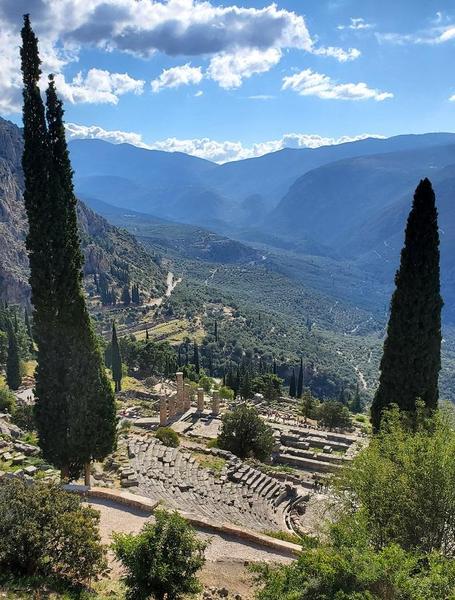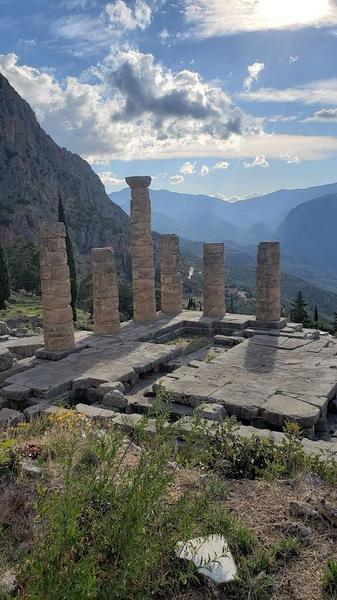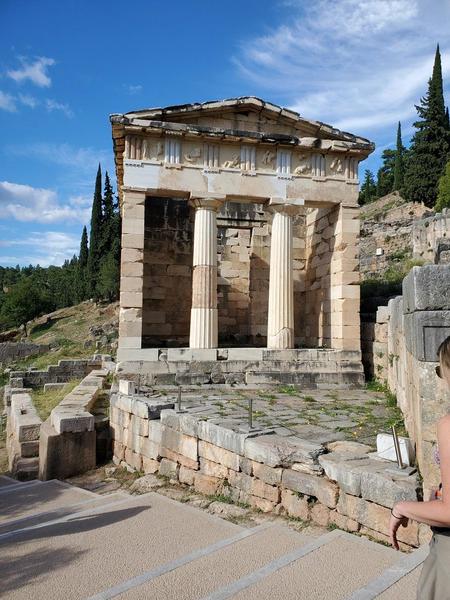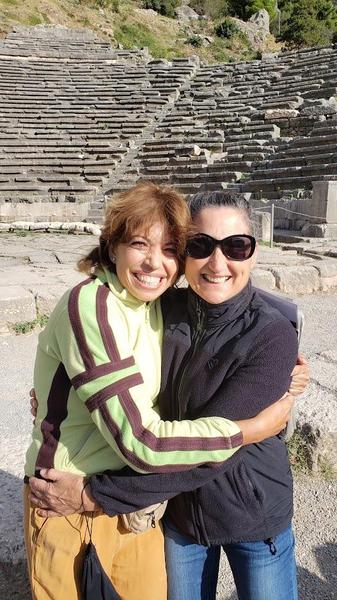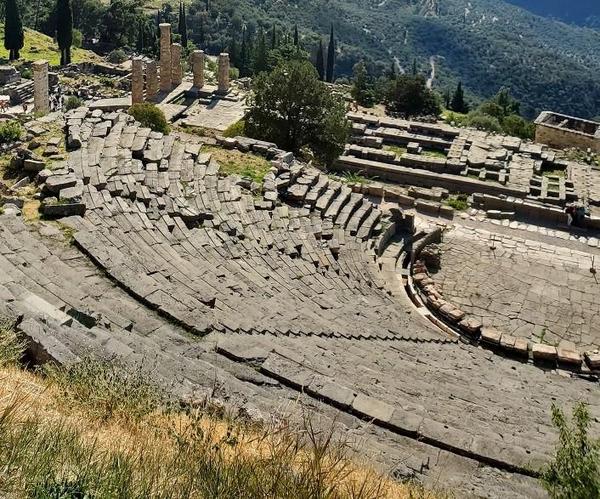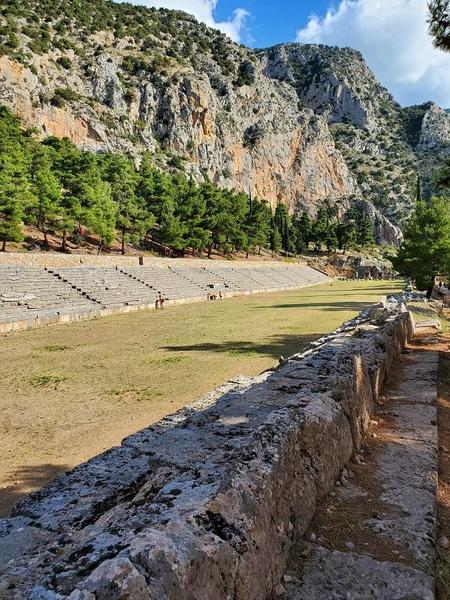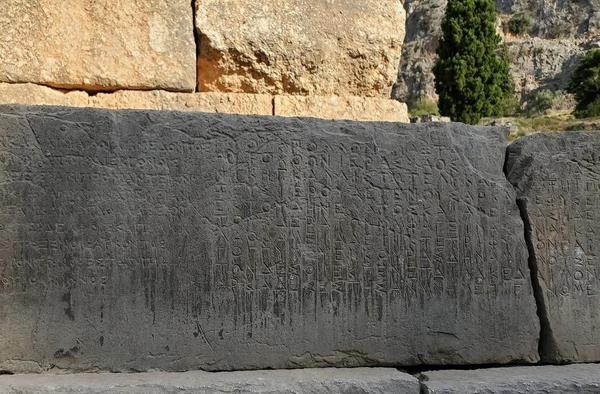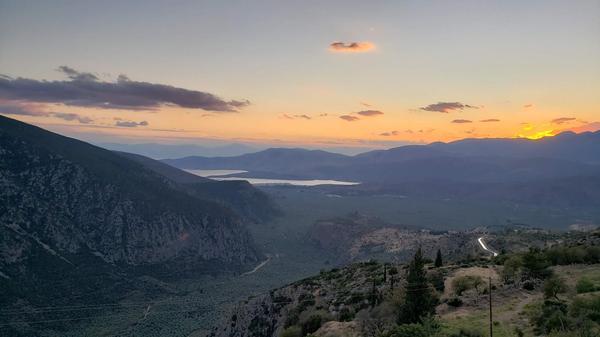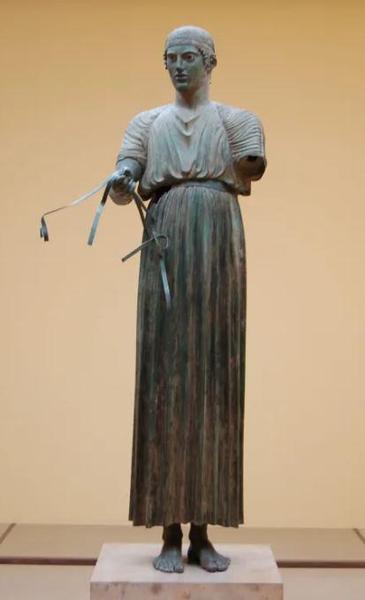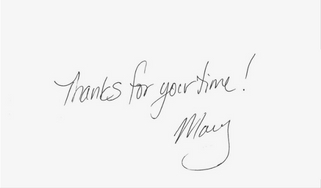2022 Hello , First, a heartfelt thank you to everyone who sent condolences last week on the loss of my father. It's a bittersweet milestone in life that most all of us pass at some point, in some way in our lives. It's helps
to know I'm not alone. And now my long-promised story about my visit to the site of the Ancient Greek Oracle of Delphi. Before I left on my vacation to Greece, I told friends I would be visiting the oracle and jokingly asked what wisdom they would like me to seek for them. For are we not much the same as people who lived 10,000 years ago?
We have some dilemma, some question or uncertainty that we long to resolve. And wouldn't it be great, if there was someone we could ask who had the wisdom to give us a definitive answer? Over the centuries many have turned to religious faith for certainty. And in fact, scholars believe Delphi probably originated as a sacred site to worship the Goddess of Earth, Gaia, the
ancestral mother of all life back in, oh, about 1600 BCE! It was profoundly moving to walk the paths of a place that has been sacred ground for 36 centuries. The wisdom I heard there is sobering and also, freeing. And as relevant today as in ancient times.
Wisdom from the Ancient Oracle of Delphi
The archeological site of ancient Delphi perches high on the slopes of Mt. Parnassos, in central Greece, overlooking the Gulf of Corinth and slopes of olive groves. So as the story goes, Zeus, king of all the Greek gods, first marked this as special place. Desiring to discover the center of all the earth, he sent two eagles to fly around the world in opposite directions. They met at Delphi, establishing the omphalos,or "bellybutton" of the world. Later, when Apollo came
along, a terrible earth serpent, Python, lived here. Apollo battled it to the death and claimed the oracle. The oracle was a woman called the Pythia, or rather a series of women over the centuries, who communed directly with Apollo. Below: View to the east from the archeological site of Ancient Delphi.
Delphi reached its heyday between the sixth and the fourth centuries BC. The oracle became so influential heads of state, or their emissaries, journeyed from throughout the known world seeking wisdom
concerning matters of politics and war. Ordinary people, too, asked the oracle's advice on matters of family, business and love. A number of temples on the site were destroyed by fire and earthquake. The remains we see today in the photo below were uncovered in the first excavation of the site in n 1892. Evidence suggests a a golden statue of Apollo stood at the center, before the hearth of an eternal fire where pilgrims offered their sacrifices . Below: Ruins of the Temple of Apollo at Delphi. (Photo by Mike Farrell)
In a room built under Apollo's temple, the Pythia sat on stool directly over a fissure in the rocks breathed in vapors that put her in a trance. Priests met visitors arriving at the temple and relayed their questions to the oracle. She answered with a dazed voice sometimes chanting, singing or speaking in poetry. Often her message was obscure, puzzling or ambiguous. The priests then interpreted her words to
the questioner waiting for guidance. In the words of Heraclites, an ancient Greek philosopher from the 6th century, "The oracle neither conceals, nor reveals, but indicates." The intermediary priests gathered intel, as visitors traveled from all corners of the ancient
world, which helped them speak with knowledge and authority that could have believably come from the gods. At this time in history, the area we know as Greece was a collection of city states, as many as 1000, and they were constantly at war with each other, eventually leading to the Peloponnesian War (431–404 BCE). Leaders of these city states came to Delhi, not only to ask for advice, but to celebrate their victories with offerings and tithes from spoils of war. The Greed states like Athens, Sparta, Corinth, Thebes and many more built chapels, statues and treasuries for their riches. Part of
the Athenian treasury still stands. It was one of the biggest and fanciest.
Amid these
warring factions of ancient Greece there were forces at work fostering human progress, encouraging development of the body, mind and spirit. Delphi played a large role in promoting this evolution. Our tour guide, Penny Kolomvotsou explained that as people from all over the known world gathered, enemies and allies, there was a constant interplay between complex social, political and religious ideas and how those were manifested. Penny was an amazing font of knowledge, not only the facts of the archeological site, and the history of the oracle, but philosophy, a deep understanding of the relevance of Delphi today as well as in ancient times. Below: I smile for the camera with our guide Penny Kolomvotsou. (Photo by Mike Farrell)
I was fascinated.
I could have listened to her all day. When I admitted that I would forget most of what I'd learned, Penny said, "You have been here. You have walked on this ground and now it's a part of you. That's what's important." It was amazing
to stand in the theater at Delphi, which seated 5,000 people and try to imagine the sights and sounds that once filled this space.
During the 6th century BCE Dephi started hosting a pan-Hellenic (or "all-Greek") festival once a year, offering a stage for artistic endeavors. There were
competitions in music, poetry, dancing, painting, which gave rise to theatrical competitions. Later, the festivals were combined with the Pythian Games, which like the Olympics were an effort to promote peace and harmony in Ancient Greece. Every four years Greeks representing
the many city states came to Delphi to lay down their weapons and compete in games to show their skill and strength. A bit from the Ovid, The Metamorphoses, references the Pythian games, "In these the happy youth who proved victorious in the chariot race, running and boxing, with an honored crown of oak leaves was
enwreathed." The sports stadium for the Pythian games is built into the hillside above the temple with seating for some 7,000
Penny pointed out ancient Greek
script on the base of the Athenian treasury, where one could see letters spelling Marathon, probably indicating Athenians had been here touting their victory over the Persians in that famed battle in 490 BC.
Phrases carved over the gateway to the ancient temple at Delphi give us more clues to the wisdom the oracle was dishing out. You may have heard these bits of advice yourself. "Know thyself," is attributed to Socrates. Were these words carved before or after the oracle proclaimed Socrates the wisest man in Greece? I don't know. But Socrates took the oracle's words as an affirmation of his agnosticism. According to Plato, Socrates defended himself on trial, saying, "If I am the wisest man alive, it is for I know one thing, and that is that I know
nothing." Two more maxims carved at Delphi: "Surety brings ruin," and “Nothing in excess.” "Always, it is about balance," Penny explains. "The Oracle at Delphi had to do with war, peace, morals and ethics. The answers are not necessarily yes or no, but they require discussion and debate." One of the stories... is about the king who feared he was about to be attacked by an enemy in the land across the river. He asked the oracle; shall I dig in my defenses or make the first strike? The oracle replied, if you step one foot across the river, a kingdom will fall. He attacked and was defeated, his own kingdom falling. With a prophecy from the oracle, Penny says, there is a choice to be made. "You see how beautiful that is? My future is not dictated by any god, but if it is not, then who am I, where am I? I must become responsible for my own outcome." In essence, Penny says, "Become the hero of your own life." . The wisdom of Delphi seems to be that keeping an open mind may be more
important than finding a single answer. Below, the Gulf of Corinth, a view toward the west end of the valley from our terrace in Delphi. (Photo by Mike Farrell)
Modern geologists
have discovered that almost directly under the Temple of Apollo lie two intersecting geographical fault lines. This explains the propensity for earthquakes in the region. Also, under the temple, modern scientists have detected gases emanating from a crack in the rocks, including ethane, methane, ethylene, and benzene. Enough to put anyone into an altered state and might explain reports of the varied states of the Pythiai, including at different times being ecstatic, agitated, bounding and leaping about, or fainting. Sometimes the Pythia died. The Oracle of Delphi prophesied for many centuries, influencing major events and personal love stories. Directing leaders of the Greek city states, the oracle played a role in political reforms that continue to impact the western world today. The riches at Delphi were plundered many times over the centuries, but the oracle remained. The Pythia gave her last advice around 393 CE when the Roman emperor Theodosius ordered the
closure of all pagan sanctuaries. In the years to come it was preserved by an earthquake, only discovered again in the first modern excavation in 1892. “Archeologists always make decisions on which layer to keep and which layer to damage,” says Penny. “When they first came to Delphi and didn’t have
the big equipment, they made the wise decision to leave it as it is. In 1939, archeologists had to go back to fix broken stones, which gave them the opportunity to dig and they accidentally found gold-and-ivory statues of Apollo, his sister Artemis and their mother
Leto.” A statue of a charioteer was discovered still standing, looking down over the temple of Apollo.
The charioteer it
is the only figure to survive from a larger grouping of four horses and a groom. It's eyes of inlaid stones and its eye lashes remain for visitors to see in the museum at Delphi which holds many of the artifacts found during excavation. Thank you for your kind attention. This may be more than you ever wanted to know about Delphi! But if
not, you can see more of the artifacts discovered at the site at the museum website here...
Like my article today? Please share:
My goal is to be back writing to you on a weekly basis. Thanks so much for your support!
Follow me on social media
Read a great book? Have a burning question? Let me know. If you know someone who might enjoy my newsletter or books, please forward this e-mail. I will never spam
you or sell your email address, you can unsubscribe anytime at the link below.
To find out more about my books, how I help students, teachers, librarians and writers visit my website at www.MaryCronkFarrell.com.
Contact me at MaryCronkFarrell@gmail.com. Click here to subscribe to this newsletter.
|
|
|
